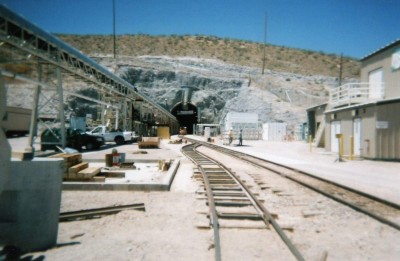A federal appeals court has removed a hurdle for Nevada’s Yukka Mountain to become the nation’s central nuclear waste repository, heavily criticizing the Obama administration in the process.
The US Court of Appeals for the District of Columbia ruled Tuesday that the Nuclear Regulatory Commission has violated federal law by delaying a decision on the site. A decade ago, Congress passed and President Bush signed a bill designating Yukka Mountain as a nuclear waste repository. The area is about 90 miles northwest of Las Vegas.
The commission is an independent agency created by Congress tasked with overseeing commercial nuclear operations. Although it is technically independent, all five of its commissioners are appointed by the president. The Commission had ruled in 2011 to allow the Obama administration to close the site.
The federal appeals court voted 2-1 in favor of forcing the commission to finish the licensing process for the dump and either reject or approve the facility. The Energy Department’s application for the unfinished nuclear waste plant has been in limbo due to the administration’s position.
Nuclear waste remains radioactive for tens of thousands of years. Opponents of the site argue it’s dangerous to transport the waste to Nevada on the roads and railroads, particularly through highly populated areas. They call such transports “mobile Chernobyls.”
About 19 percent of the nation’s energy comes from nuclear power.
The court’s decision stated that the commission was “simply flouting the law” when it permitted the administration to move ahead with plans to close Yukka Mountain as a repository.
How To Survive A Dirty Bomb Blast, An Atomic Explosion, Or Even A Nuclear Reactor Meltdown
“The president may not decline to follow a statutory mandate or prohibition simply because of policy objections,” Judge Brett M. Kavanaugh, a Bush nominee, wrote for the majority. “It is no overstatement to say that our constitutional system of separation of powers would be significantly altered if we were to allow executive and independent agencies to disregard federal law in the manner asserted in this case by the Nuclear Regulatory Commission. The commission is simply defying a law enacted by Congress without any legal basis.”
Judge A. Raymond Randolph (nominated by President George H.W. Bush) joined Kavanaugh in the majority decision, while Chief Judge Merrick B. Garland (President Clinton nominee) dissented.
The Yucca Mountain nuclear waste storage facility battle encompasses more than 30 years of vocal debate between supporters and foes. The US government has spent approximately $15 billion of taxpayer money on the not-yet-complete site.
Washington State and South Carolina were among the multiple parties to the lawsuit filed against the Nuclear Regulatory Commission. Both of the states are home to massive nuclear waste sites which would utilize the Yucca Mountain storage plant.
“This decision reaffirms a fundamental truth, the president is not above the law,” said South Carolina Attorney General Alan Wilson. “The Obama administration cannot pick and choose which laws to follow and which to ignore.”
Republican Reps. John Shimkus of Illinois and Fred Upton of Michigan called the ruling a “significant milestone” which proved the Obama administration acted prematurely when opting to shut down the repository.
“The Obama administration rejected the law and prematurely terminated the Yucca Mountain repository program, but Congress and the courts have spoken out to prevent billions of taxpayer dollars and three decades of research from being squandered,” they said.
U.S. Sen. Dean Heller, R.-Nev., criticized the court’s ruling.
“Today’s decision serves as yet another example of why Yucca Mountain needs to be taken off the table once and for all,” Heller said. “This ruling is an exercise in futility that will ultimately waste resources that could be better used elsewhere. Instead of continuing to try to force Yucca Mountain on the people of Nevada, my colleagues should focus on moving forward towards a new process that will allow for consent-based siting.”
 Off The Grid News Better Ideas For Off The Grid Living
Off The Grid News Better Ideas For Off The Grid Living




